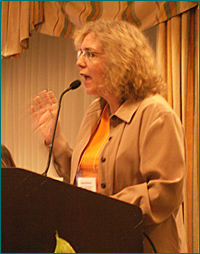PANEL HIGHLIGHTS

Reporter Susan Brenna and editor Jan Schaffer discuss the findings from interviews with 31 site operators for J-Lab’s study of citizen media sponsored by the Ford Foundation.
Optimistic about their influence on community issues and their financial prospects, operators of hyperlocal online news sites say they plan to press ahead, according to interviews conducted as part of a national study of the sustainability of citizen media.

Susan Brenna
The study, funded by the Ford Foundation, also will include an online survey of community news site consumers and operators, said Jan Schaffer, J-Lab director.
In the study’s first phase, freelance journalist Susan Brenna interviewed operators of 31 sites. The oldest of the sites had existed for three years; the youngest for 2 months. And while they plan to stick around, they do not intend to replace – or to duplicate – traditional journalism.
“Their aspiration is not to be comprehensive necessarily,” Brenna said. “And in fact, many of them are hoping that what they’re doing on their sites is going to lead to better local coverage by the existing media.”
“There’s a lot of voice, and a lot of subjectivity,” Brenna said. “But one thing that you see on these sites that you don’t see a lot of in newspapers or traditional journalism is that there’s also a lot of kind of naked caring and passion: ‘I really care what happens in my community. I’m raising this because it means something to me and the people I know.'”
Among the findings from the first phase of the study:
- Optimism abounds. Across the 31 sites, operators and content providers were consistently positive in their thinking about the site’s impact and future.
- One size does not fit all. Community news sites are vastly varied, ranging from sophisticated operations backed by major media operations to lone bloggers attempting to document life where they live.
- The future looks bright. Most site operators say they already are successful or expect to be in the near future.
- It’s not always a numbers game. Even sites with low visitor tallies and few contributors say they think they are having an impact in their community by influencing decision makers and public discourse.
- The marketing challenge. Only nine of 31 sites surveyed said they had conducted any marketing to drive traffic or contributors to their sites.
Most sites consider themselves a success because they are getting conversation started in the community, Brenna said.
“We asked people how long they would stay at it,” Schaffer said. “I think 20 of the 31 we interviewed said they aspired to be self-sustaining. Seven said they already were.”
Said Brenna: “Everybody, unanimously, thinks they’re going forward into the future indefinitely.”
Jump to other panel summaries:
Panel 1: New Kinds of Hyperlocal Start-ups
Panel 2: Solo-jos with Community Impact
Panel 3: Mainstream Media: Past Lessons, Future Vision
Panel 4: Building Sustainability
Panel 5: Citizen Television Correspondents
First Release: Highlights of Phase 1, Ford-funded study of citizen media projects







